Mainframe developers are the backbone of legacy systems, ensuring that critical business operations run smoothly. They work with large-scale computing frameworks, maintaining and updating systems that handle vast amounts of data and transactions.
Mainframe development skills include proficiency in languages like COBOL, JCL, and PL/I, as well as familiarity with databases such as DB2. Additionally, strong analytical skills and attention to detail are important for this role.
Candidates can write these abilities in their resumes, but you can’t verify them without on-the-job Mainframe Developer skill tests.
In this post, we will explore 8 essential Mainframe Developer skills, 10 secondary skills and how to assess them so you can make informed hiring decisions.
Table of contents
8 fundamental Mainframe Developer skills and traits
The best skills for Mainframe Developers include COBOL Programming, JCL (Job Control Language), DB2, CICS, TSO/ISPF, VSAM, Assembler Language and RACF.
Let’s dive into the details by examining the 8 essential skills of a Mainframe Developer.
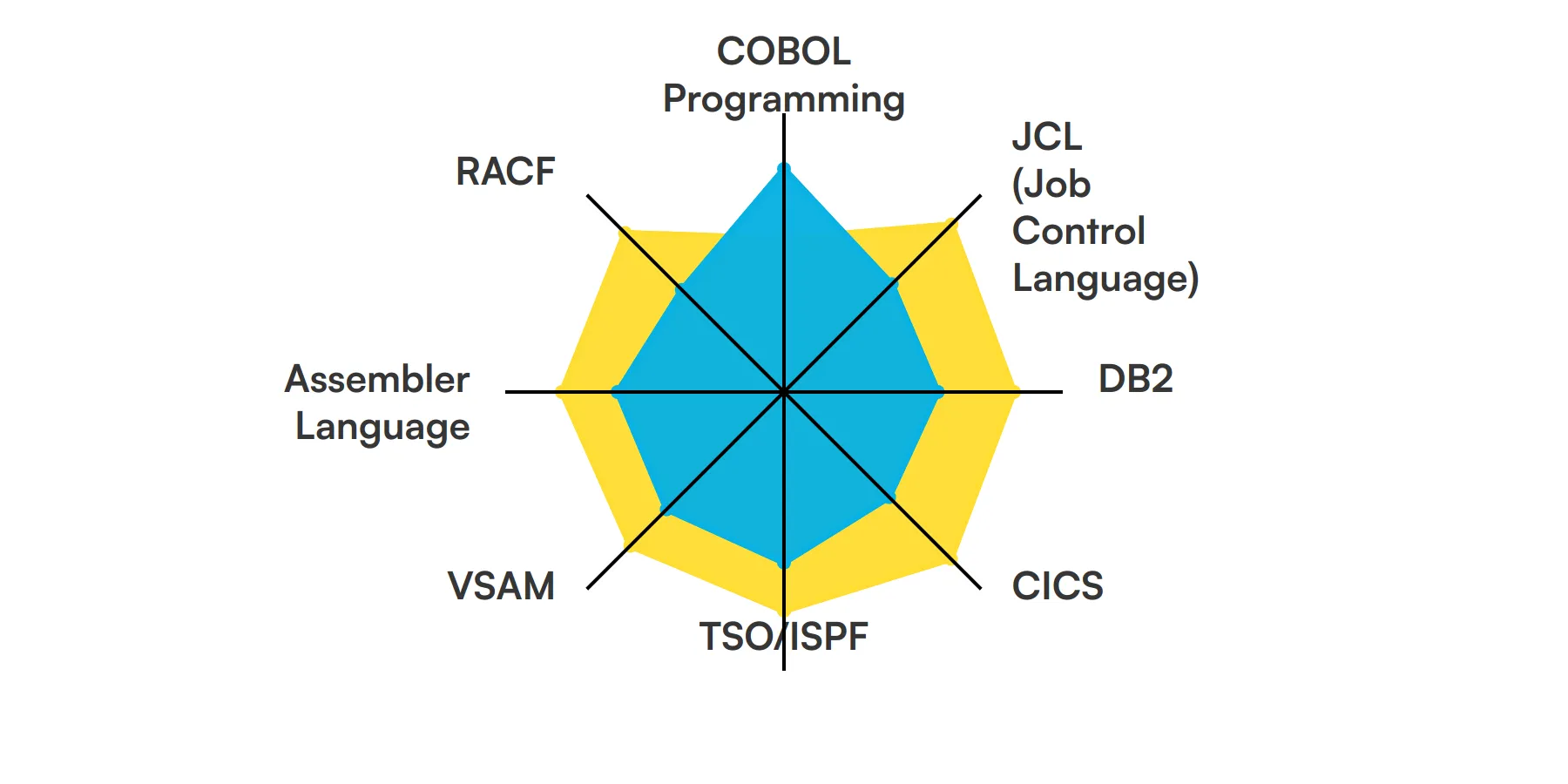
COBOL Programming
COBOL is the backbone of mainframe development. A mainframe developer uses COBOL to write and maintain critical business applications. Mastery of COBOL ensures that the developer can handle legacy systems and update them as needed.
For more insights, check out our guide to writing a Mainframe Developer Job Description.
JCL (Job Control Language)
JCL is used to instruct the mainframe on how to run a batch job. A mainframe developer needs to be proficient in JCL to manage job streams, schedule tasks, and handle data processing efficiently.
DB2
DB2 is IBM's database management system for mainframes. A mainframe developer must know how to interact with DB2 to perform database operations, write SQL queries, and ensure data integrity.
Check out our guide for a comprehensive list of interview questions.
CICS
CICS (Customer Information Control System) is used for online transaction processing. Mainframe developers use CICS to build and manage high-volume transaction applications, ensuring they run smoothly and reliably.
TSO/ISPF
TSO (Time Sharing Option) and ISPF (Interactive System Productivity Facility) are tools for interacting with the mainframe. Developers use these tools for editing, compiling, and managing datasets, making them essential for day-to-day tasks.
VSAM
VSAM (Virtual Storage Access Method) is a file storage access method used in mainframes. Mainframe developers need to understand VSAM to manage and access data files efficiently.
Assembler Language
Assembler language is used for low-level programming on mainframes. A mainframe developer might use assembler for performance-critical applications or to interact directly with hardware.
RACF
RACF (Resource Access Control Facility) is used for security management on mainframes. Developers need to understand RACF to manage user permissions and ensure system security.
10 secondary Mainframe Developer skills and traits
The best skills for Mainframe Developers include REXX, MQ Series, IMS, SDSF, PL/I, Unix System Services, Batch Processing, Debugging Tools, Performance Tuning and Change Management.
Let’s dive into the details by examining the 10 secondary skills of a Mainframe Developer.
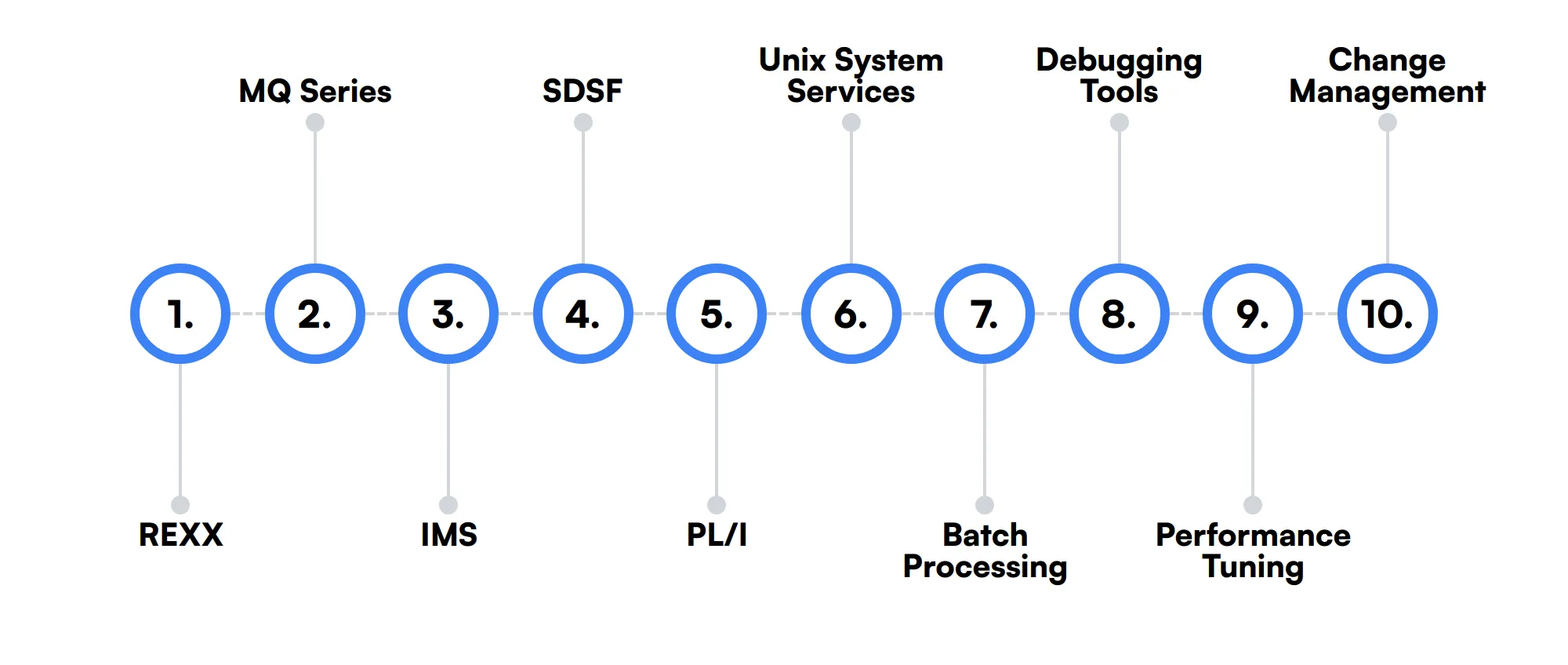
REXX
REXX is a scripting language used for automating tasks on the mainframe. It can help developers write scripts to streamline repetitive tasks and improve productivity.
MQ Series
MQ Series is IBM's messaging middleware. Mainframe developers use it to enable communication between different applications, ensuring seamless data exchange.
IMS
IMS (Information Management System) is a database and transaction management system. Knowledge of IMS helps developers manage hierarchical databases and high-volume transactions.
SDSF
SDSF (System Display and Search Facility) is used for monitoring and managing jobs on the mainframe. Developers use SDSF to track job status, view logs, and troubleshoot issues.
PL/I
PL/I is a programming language used in some mainframe environments. Familiarity with PL/I can be beneficial for maintaining and developing certain legacy applications.
Unix System Services
Unix System Services (USS) provides a Unix-like environment on the mainframe. Developers might use USS for tasks that require Unix tools or scripts.
Batch Processing
Understanding batch processing is crucial for managing large volumes of data and jobs. Developers need to know how to schedule, execute, and monitor batch jobs effectively.
Debugging Tools
Proficiency with debugging tools like IBM Debug Tool or Xpediter is important for identifying and fixing issues in mainframe applications.
Performance Tuning
Performance tuning skills help developers optimize mainframe applications for better efficiency and speed, ensuring that systems run smoothly under heavy loads.
Change Management
Knowledge of change management processes and tools is important for tracking and managing changes to mainframe applications, ensuring stability and compliance.
How to assess Mainframe Developer skills and traits
Assessing the skills and traits of a Mainframe Developer involves more than just glancing at a resume. It's about understanding how well they can handle the specific technologies and challenges that come with maintaining and developing on legacy systems.
Mainframe systems are critical for large-scale enterprise operations, and the developers who work on them need a deep understanding of specific languages and systems like COBOL, JCL, DB2, CICS, and more. To truly assess these skills, you need a method that goes beyond traditional interviews and looks directly at their hands-on capabilities.
This is where Adaface assessments come into play. By incorporating practical tests tailored to include scenarios involving TSO/ISPF, VSAM, Assembler Language, and RACF, Adaface helps you ensure that your candidates are not only familiar with the terms but can also apply their knowledge effectively. With Adaface, companies have seen a 85% reduction in screening time, making it a smart choice for efficient hiring.
Let’s look at how to assess Mainframe Developer skills with these 4 talent assessments.
COBOL Online Test
Our COBOL Online Test evaluates candidates on their knowledge of the COBOL programming language, including their proficiency in working with data types, control structures, file handling, and database access.
The test assesses their understanding of COBOL Data Division, Procedure Division, File Handling, Sorting and Merging, Conditional Statements, Subprograms and Functions, and Error Handling. Candidates navigate through scenario-based MCQs to demonstrate their ability to work with COBOL effectively.
Successful candidates show a strong grasp of COBOL software tools and techniques for developing, maintaining, and deploying COBOL applications that adhere to industry standards and best practices.
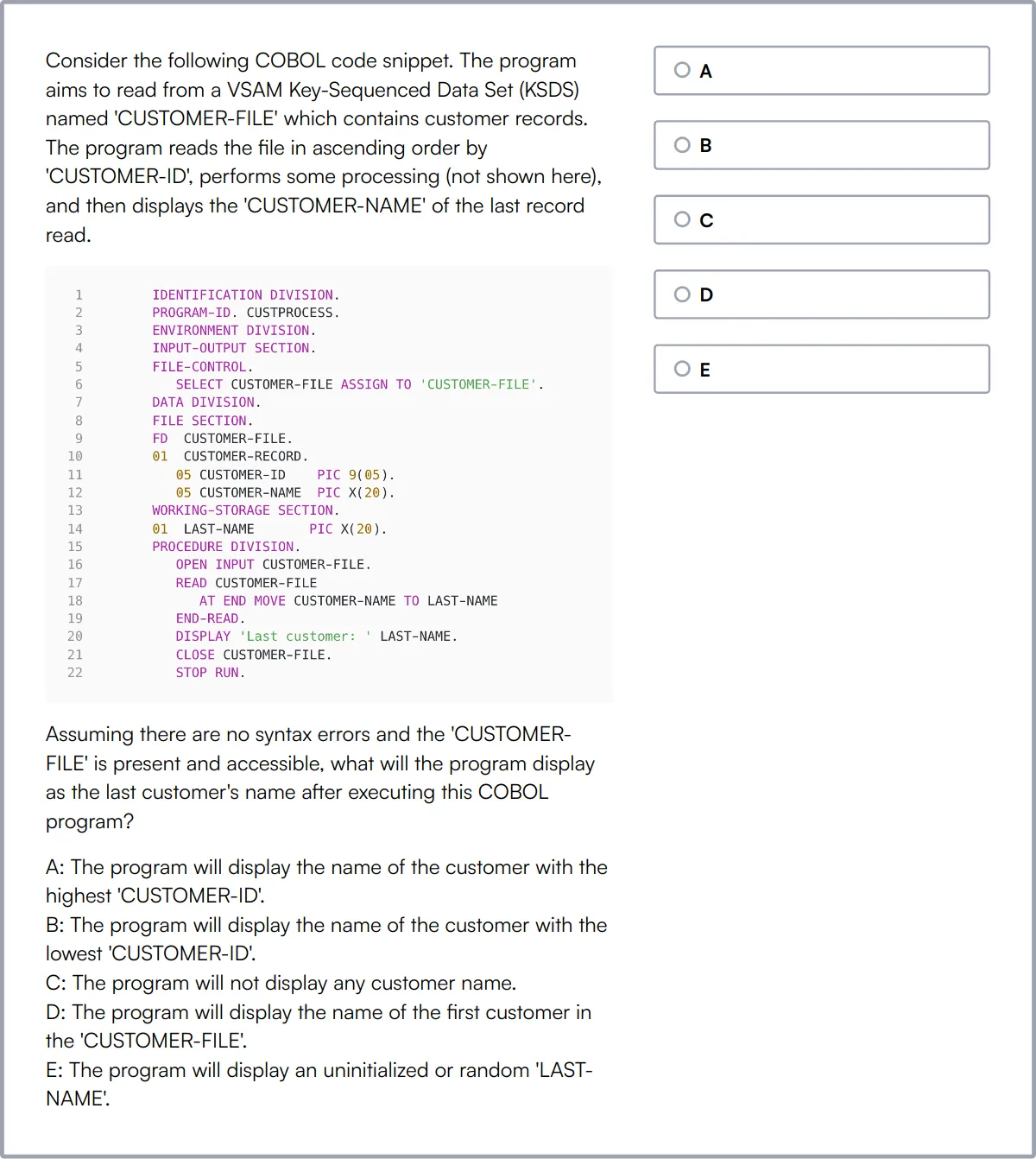
JCL Online Test
Our JCL Online Test evaluates candidates' ability to design, develop, and manage JCL (Job Control Language) scripts for batch processing in large enterprise environments.
The test assesses skills such as creating and modifying job control statements, coding condition codes, using utilities like SORT and IDCAMS, managing resources, and analyzing JCL error messages. Candidates are tested through scenario-based MCQs to demonstrate their proficiency.
High-scoring candidates show expertise in job scheduling, job dependency, and job execution, ensuring they can handle complex batch processing tasks efficiently.
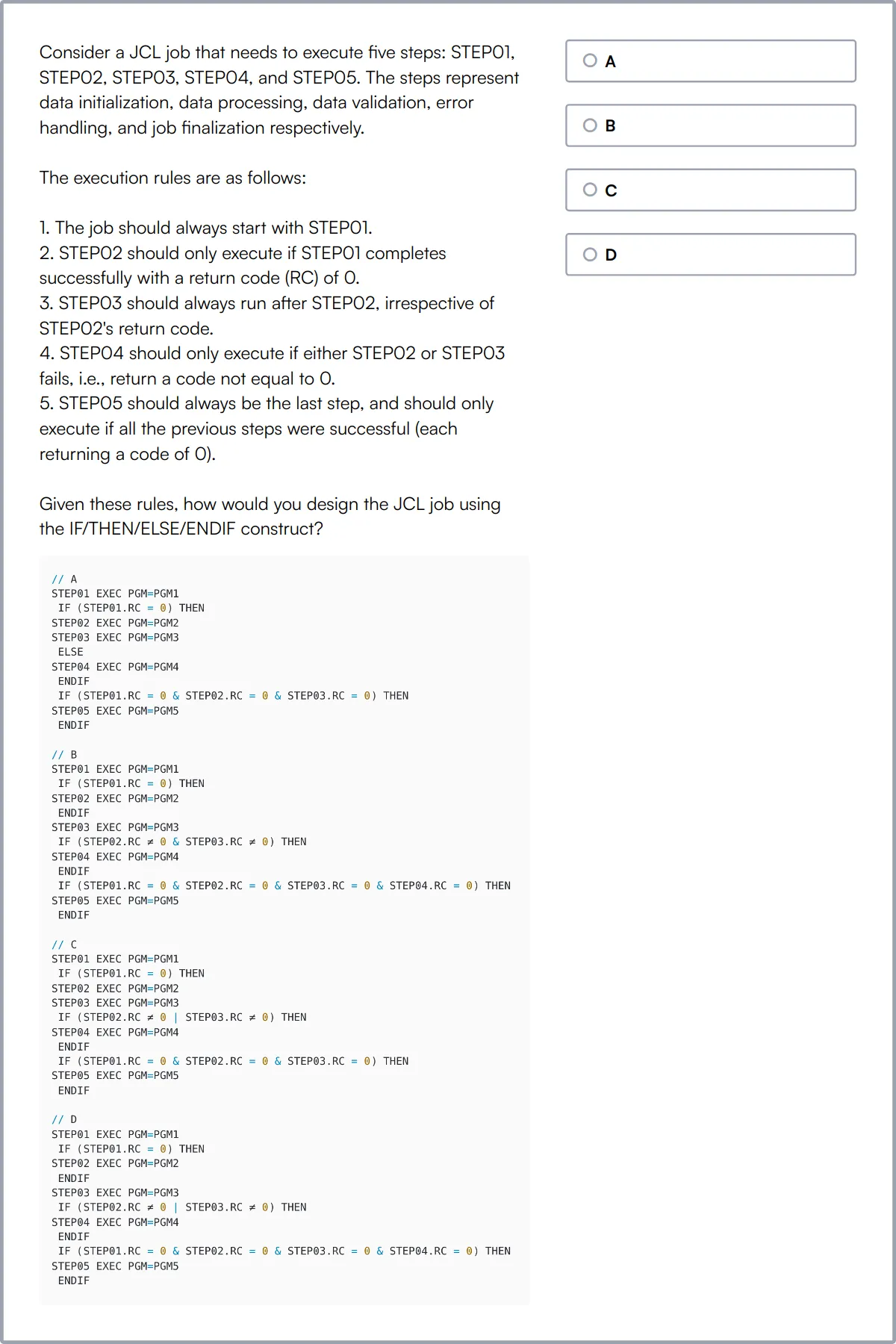
IBM DB2 Database Online Test
Our IBM DB2 Online Test evaluates candidates on their technical knowledge and practical skills related to IBM DB2, including database design, administration, security, performance, and backup and recovery.
The test covers SQL Basics, Database Design, Data Manipulation, Table Creation, Indexes and Constraints, Joins and Subqueries, Stored Procedures, Triggers, Concurrency and Locking, Performance Tuning, and Backup and Recovery. Candidates navigate through scenario-based MCQs to demonstrate their proficiency.
Successful candidates show a strong understanding of IBM DB2 best practices, design patterns, and techniques, ensuring they can design, develop, and manage efficient and effective IBM DB2 databases.
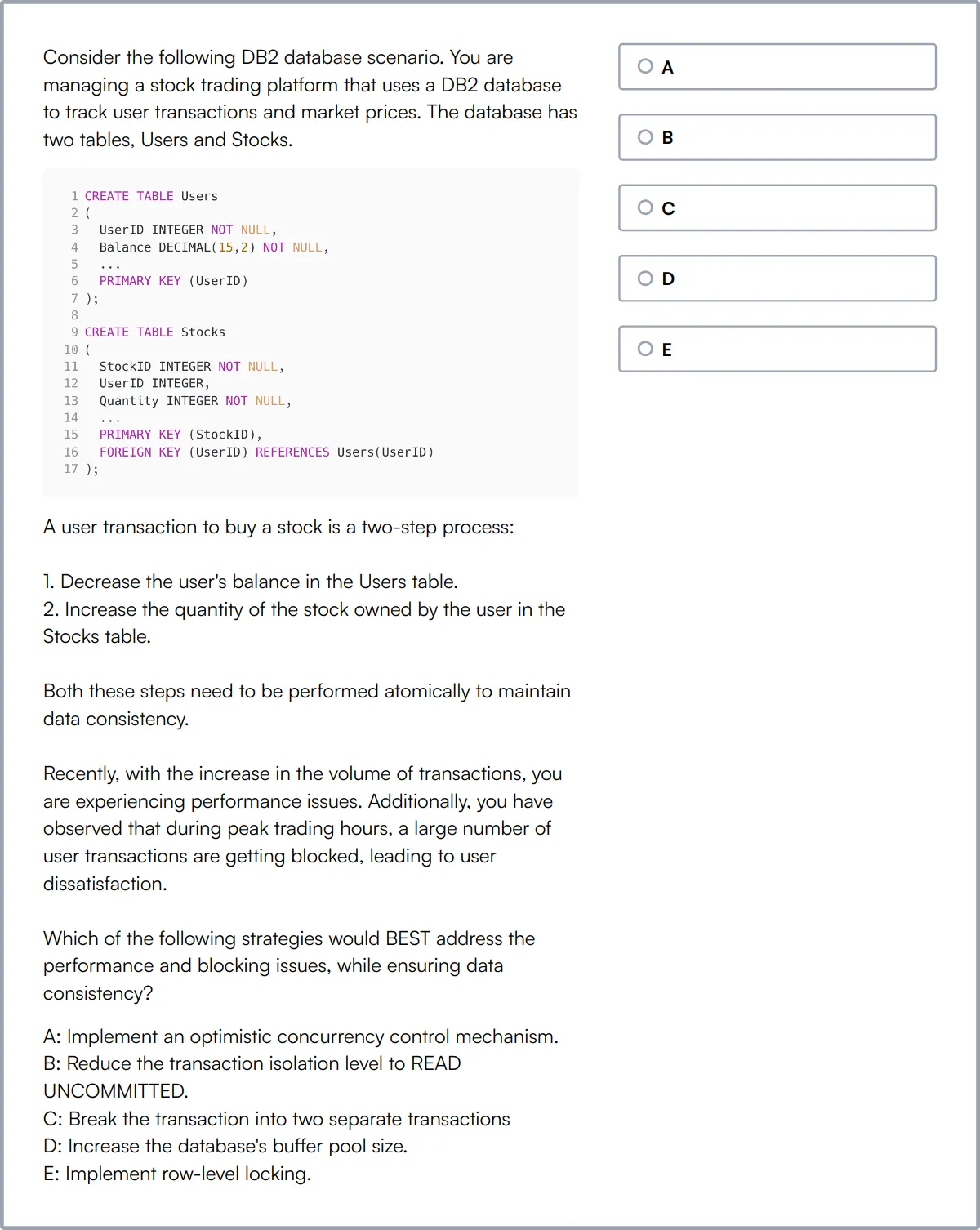
IBM Mainframe Online Test
Our Mainframe Online Test evaluates candidates on their knowledge of mainframe technologies, including COBOL, JCL, VSAM, CICS, and DB2.
The test assesses skills in COBOL, JCL, VSAM, DB2, CICS, IMS, Assembler, RPG, PL/I, TSO, and ISPF. Candidates navigate through scenario-based MCQs to demonstrate their ability to design and develop mainframe applications.
High-scoring candidates show proficiency in developing mainframe applications that adhere to industry standards and best practices, ensuring they can handle complex mainframe environments effectively.
Summary: The 8 key Mainframe Developer skills and how to test for them
| Mainframe Developer skill | How to assess them |
|---|---|
| 1. COBOL Programming | Evaluate a developer's ability to write and maintain COBOL code. |
| 2. JCL (Job Control Language) | Assess understanding and application of JCL for job management. |
| 3. DB2 | Test knowledge in managing and querying DB2 databases. |
| 4. CICS | Check proficiency in handling online transaction processing with CICS. |
| 5. TSO/ISPF | Review skills in using TSO/ISPF for mainframe tasks. |
| 6. VSAM | Determine capability to manage data with VSAM systems. |
| 7. Assembler Language | Gauge ability to write low-level mainframe programs. |
| 8. RACF | Evaluate understanding of RACF for mainframe security management. |
IBM Mainframe Online Test
Mainframe Developer skills FAQs
What is COBOL programming and why is it important for Mainframe Developers?
COBOL (Common Business-Oriented Language) is a high-level programming language used in business, finance, and administrative systems. Mainframe Developers use COBOL to write and maintain critical applications.
How can recruiters assess a candidate's proficiency in JCL?
Recruiters can assess JCL skills by asking candidates to write sample job control scripts, explain JCL statements, and solve common job scheduling problems.
What role does DB2 play in mainframe development?
DB2 is an IBM database management system. Mainframe Developers use DB2 to manage and query large datasets, ensuring data integrity and performance.
Why is knowledge of CICS important for Mainframe Developers?
CICS (Customer Information Control System) is used for online transaction processing. Developers need CICS skills to build and maintain interactive applications.
What is TSO/ISPF and how is it used?
TSO (Time Sharing Option) and ISPF (Interactive System Productivity Facility) are tools for interacting with the mainframe. They help developers edit code, manage files, and execute commands.
How can recruiters evaluate a candidate's experience with VSAM?
Recruiters can ask candidates to describe their experience with VSAM (Virtual Storage Access Method), including creating and managing datasets, and solving performance issues.
What is the significance of RACF in mainframe security?
RACF (Resource Access Control Facility) is used to manage security on mainframes. Developers need to understand RACF to ensure data and application security.
How do Debugging Tools assist Mainframe Developers?
Debugging tools help developers identify and fix code errors. Recruiters can ask about specific tools like IBM Debug Tool and how candidates use them to troubleshoot issues.

40 min skill tests.
No trick questions.
Accurate shortlisting.
We make it easy for you to find the best candidates in your pipeline with a 40 min skills test.
Try for freeRelated posts
Free resources



